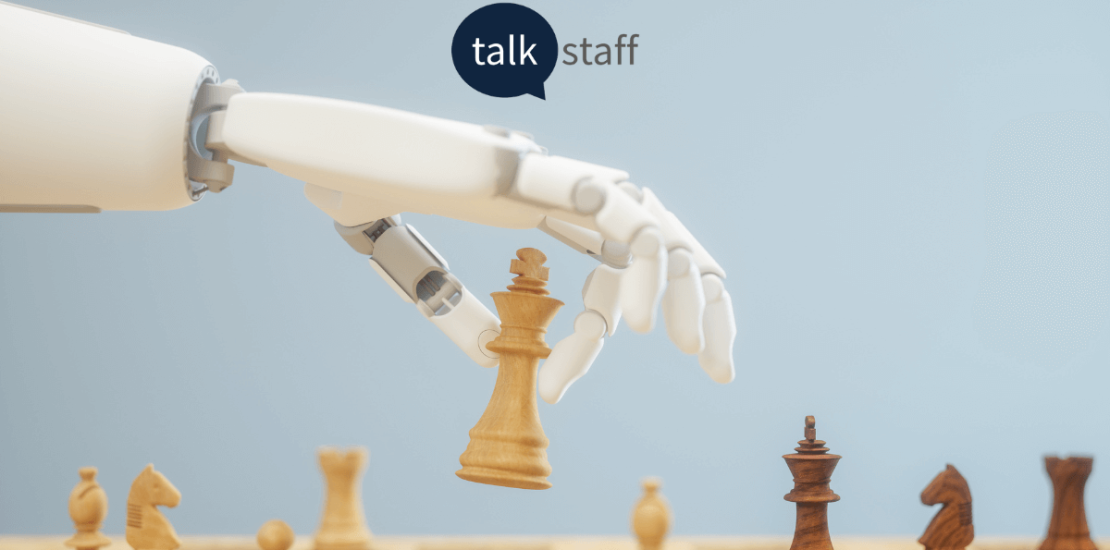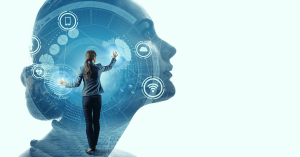AI and HR: Risks vs opportunities
- July 12, 2023
- Posted by: Hannah Ingram
- Category: HR Advice & Support

How AI Effects HR
Is your HR department ready for AI?
Technology is moving fast, and it’s bound to cause complications in the workplace, this means HR departments will need to think hard about the risks and opportunities for employees. By preparing for the changes happening now, and soon, you can set your HR team and the people in your organisation up for greater success in the future.
Here are some things to consider:
How is Artificial intelligence used at work?
AI powered tools can be helpful and boost productivity and creativity when used correctly. But this new tech also poses a risk around confidentiality and data breaches.
41% of employers see generative AI as more of an opportunity than a risk according to a recent CIPD report. 40% of employers see increased productivity and efficiency as an organisational benefit of using AI at work.
In some cases, these technologies could damage trust with customers and stakeholders when not used with caution. Work with department heads to agree on guidelines for AI tool use.
The AI security risk
AI is being used to target businesses with a new wave of sophisticated spam, the threat is heightened because it adds a new layer of intelligence, and some of the techniques used will be less easily spotted by your team, AI is even being used to clone voices in some cases. Ensure that your teams have robust procedures and controls in place to protect your people and the business.
37% of employers see security and privacy as the main drawbacks to using generative AI, some employers are so concerned they are banning it’s use in the workplace, but the figures make it clear that more employers are starting to integrate AI into their various departments, meaning the HR function needs to take note.
Do I need to change my HR policies around AI?
Keeping up-to-date with the latest trends allows you to assess if any changes to policies are needed. Adaptability will be a key HR leadership skill in the coming years.
HR Risks and opportunities arising from AI
As the rise of AI continues, uses will vary from changing the way workers carry out their tasks to having far bigger implications for your existing team and hiring plans in the future.
AI can aid performance management or automated decision making around work allocation, pay decisions or hiring processes.


AI and hiring your team
There are some ethical questions about using AI to read CVs.
However, jobseekers are also benefitting from AI, using tools to help them practice for interviews and get the most out of their cover letters.
Bear in mind that CV writing is a skill and skilled candidates may be tripped up by using images to list key skills, which many AI tools cannot currently read.
On the other hand, using AI can help you overcome some of the deep frustrations around candidates without requirements applying for role, or getting AI to check answers on a mandatory form asking questions about experience.
Discrimination in the hiring process
You’ll want to consider if you are discriminating against neurodivergent people or other members of society by using AI to check CVs.
Hiring different people is important because of the effect it has on innovative culture, demographic diversity and cognitive diversity can play a huge role in the success of your business.
Fairness at work in the time of AI
It’s important that your HR prevention of workplace bias and unfair treatment extends to how AI is used. Take for example the recent claim against a taxi firm stating that their facial recognition found it more difficult to recognise the faces of certain staff members resulting in a disproportionate rate of terminations.
HR teams may want to establish key people who will review AI in the workplace periodically as part of a work group.
AI Anxiety and impact assessments
Unfortunately, AI is likely to have a detrimental effect on workers wellbeing. Especially for those whose jobs are directly perceived to be at risk from the rising technology. Your people may also be worried about the wider picture, of AI could get into the wrong hands globally.
Many people in creative industries for example are worried. The verdict is out on whether AI could replace 300 million full time jobs or whether this could lead to a boom in terms of AI related jobs and a boost to workplace productivity.
As with many changes over the years from the Industrial revolution to the rise of the internet and remote working there are bound to be uncomfortable periods for your workers and leaders alike.
The fear of the unknown is already likely to be taking a toll on the wellbeing of your workers.
There is also talk in parliament and the EU around risk-based regulation of AI and suggested impact assessments for workers.
“This isn’t the first time we have encountered industry disruptions – from automation and manufacturing to e-commerce and retail – we have found ways to adapt – Scott Likens”

Managing AI Anxiety
Here are 5 ways you can help your employees manage AI anxiety.
1. Try out the technology – Trying AI tools may help your team alleviate some of their concerns as they’ll discover new ways to be successful with AI as a companion rather than an enemy. This will help them understand if they need to upskill or reconsider their future careers too. Give your people a framework to try technology within safe boundaries that don’t put the company at risk.
2. Encourage an open culture – Addressing AI head on and encourage an open culture. Tread carefully with this as you want to avoid spreading panic and demotivation amongst the team. Keep your team firmly in the loop about any adoption of AI, the Why behind it and what it means for them. Finally ensure your leaders are empathetic. Ai will impact people differently and it’s important to understand this.
3. Use L&D to boost skillsets – Developing hard and soft skills will help boost their self-confidence whether these skills are linked to AI or not. This also has deeper implications for your organisation 1) As your people develop new skills this means your skills matrix in-house will appear healthier 2) You are more likely to retain your staff, as those who worry about their job security due to AI or other factors are more likely to leave.
4. Promote the role of human interaction – Understand that humans have many things going for them that AI doesn’t, and the rise of the technology may make human interaction more important. You need to consider how this effects hybrid working as thing develop further. Note that over time customers will start to trust digital interactions less as AI take over. E-mail marketing for example already uses automation in many cases so as the years progress people will be speaking with humans less and this will affect trust and dilute the effect of personalisation in messaging too.
5. Managing overwhelm – Help your people develop coping mechanisms when they are in a state of relative calm, so that when they start catastrophising they have tools in place to stay in control and avoid unwanted stress. As a people consultancy we’re lucky to have in-house wellbeing psychologists, if you’d like to explore sessions on managing overwhelm get in touch.
If you’d like a conversation about how to keep your procedures and HR policies robust in this ever-evolving world of AI give us a shout, we can provide tailored human-to-human HR advice & support depending on your unique workplace situation.
Our organisational development team run a short session on ‘How AI will shape the future organisation’ if you want to speak about this or our learning at work week inspired sessions get in touch.
Last Updated on 11 months by Hannah Ingram





